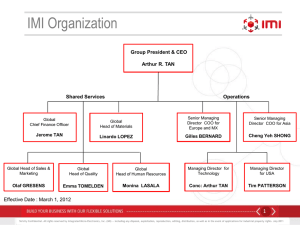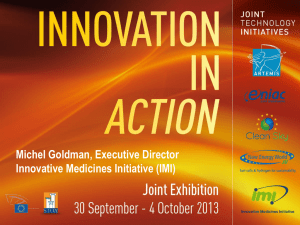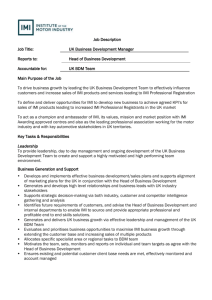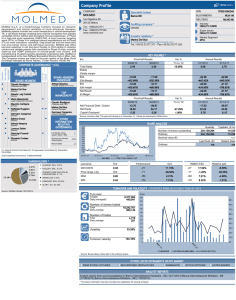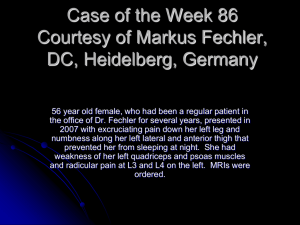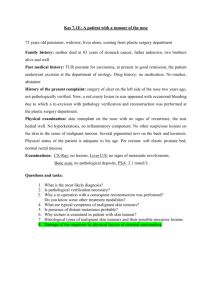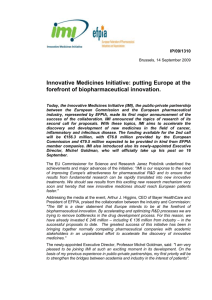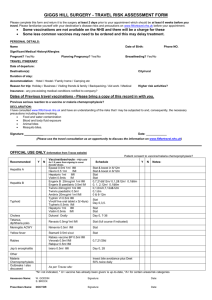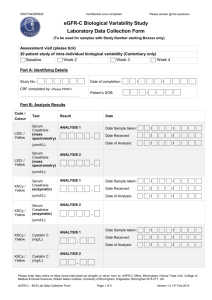PREDECT sets out to provide new laboratory models of human
advertisement
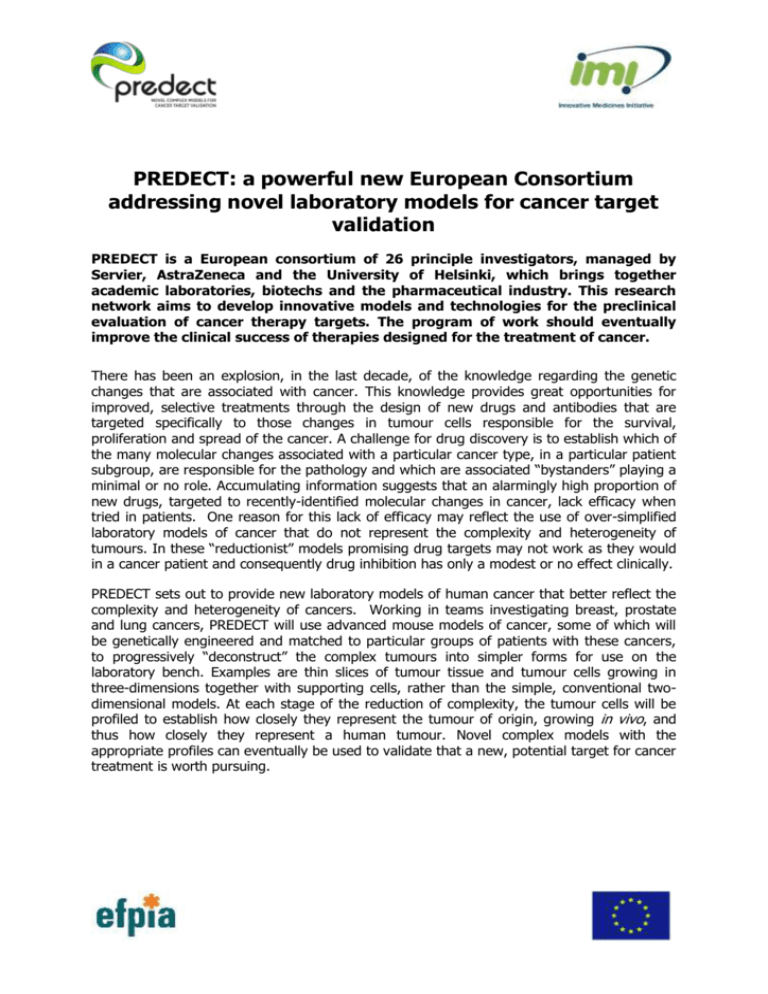
PREDECT: a powerful new European Consortium addressing novel laboratory models for cancer target validation PREDECT is a European consortium of 26 principle investigators, managed by Servier, AstraZeneca and the University of Helsinki, which brings together academic laboratories, biotechs and the pharmaceutical industry. This research network aims to develop innovative models and technologies for the preclinical evaluation of cancer therapy targets. The program of work should eventually improve the clinical success of therapies designed for the treatment of cancer. There has been an explosion, in the last decade, of the knowledge regarding the genetic changes that are associated with cancer. This knowledge provides great opportunities for improved, selective treatments through the design of new drugs and antibodies that are targeted specifically to those changes in tumour cells responsible for the survival, proliferation and spread of the cancer. A challenge for drug discovery is to establish which of the many molecular changes associated with a particular cancer type, in a particular patient subgroup, are responsible for the pathology and which are associated “bystanders” playing a minimal or no role. Accumulating information suggests that an alarmingly high proportion of new drugs, targeted to recently-identified molecular changes in cancer, lack efficacy when tried in patients. One reason for this lack of efficacy may reflect the use of over-simplified laboratory models of cancer that do not represent the complexity and heterogeneity of tumours. In these “reductionist” models promising drug targets may not work as they would in a cancer patient and consequently drug inhibition has only a modest or no effect clinically. PREDECT sets out to provide new laboratory models of human cancer that better reflect the complexity and heterogeneity of cancers. Working in teams investigating breast, prostate and lung cancers, PREDECT will use advanced mouse models of cancer, some of which will be genetically engineered and matched to particular groups of patients with these cancers, to progressively “deconstruct” the complex tumours into simpler forms for use on the laboratory bench. Examples are thin slices of tumour tissue and tumour cells growing in three-dimensions together with supporting cells, rather than the simple, conventional twodimensional models. At each stage of the reduction of complexity, the tumour cells will be profiled to establish how closely they represent the tumour of origin, growing in vivo, and thus how closely they represent a human tumour. Novel complex models with the appropriate profiles can eventually be used to validate that a new, potential target for cancer treatment is worth pursuing. The PREDECT project will provide robust technologies permitting the biotechnology and pharmaceutical industry to take early decisions on whether or not to invest in and pursue an intensive drug discovery programme on a new target, reducing wasted effort. If the technologies suggest the target is valid, these PREDECT platforms will also permit early validation of biomarkers indicating which cohorts of patients would be suggested to benefit from the drug, increasing the likelihood of success for the patient in clinical trial, and decreasing trial duration and expense. Additionally, laboratory models that better represent cancer pathologies will permit academic researchers to perform investigations of tumour biology with greater fidelity. Professor John Hickman, Coordinator for Servier of the PREDECT consortium comments: “The Innovative Medicines Initiative has allowed cancer researchers in Industry to come together to determine which are the bottlenecks in the drug discovery process that limit the emergence of more effective cancer therapies. We believe that inadequate laboratory models to investigate and validate potential targets have contributed to the failure of recent clinical trials where the drugs lacked efficacy. To create innovative technologies and platforms, more representative of the complexities associated with human tumours, we need top-flight academic expertise in cancer cell biology, bioinformatics and systems biology to complement our efforts in drug discovery. Having experienced in my own career both academic and industrial cultures, it has been exciting to create a programme which demonstrates to partners that the cultural differences between us are minimal and that we are united in trying to fulfil the urgent medical need for better cancer treatments.” Dr Emmy Verschuren, academic coordinator and representative of the IMI funding Managing Entity at the Institute for Molecular Medicine Finland, University of Helsinki, weighs in: “PREDECT is very timely. It is absolutely essential to comprehensively re-factor our model systems now, but it is also a significant task that requires academia and industry to pull together. We are bringing experts in key cancer biology areas together with young group leaders and industry partners as never before. Even with so many hands, this is not light work, but a job that has to be done urgently.” Dr Steve Wedge, Deputy Coordinator from AstraZeneca adds: “A large collaborative effort is required to systematically interrogate the behaviour of cancer targets across preclinical models of increasing complexity. This is the power of PREDECT, which brings together researchers with diverse expertise to work in true partnership, one example being that many of the supporting postdoctoral fellows within the consortium are to be co-supervised by both an academic and an industrial partner.” The five-year PREDECT project, providing new tools for target validation to improve drug efficacy, integrates a group of pharmaceutical companies composed of Hoffmann-La Roche, Bayer Schering Pharma, AstraZeneca, Boehringer Ingelheim International, Orion Pharma, Sigma-Tau and Servier whose total in-kind contributions to the project are matched by funding from the IMI Joint Undertaking, resulting in a total of 17.2 Million Euros. The academic and biotechnology company expertise essential to the programme is provided by The University of Helsinki, Biomedicum Genomics Ltd and VTT Turku (Finland), University of Tartu (Estonia) Radboud University Nijmegen and Erasmus University Rotterdam (Netherlands), Institute of Cancer Research (UK), Oncotest GMbH and the Margarete Fischer-Bosch Institute (Germany), Ecole Polytechnique Fédérale Lausanne (Switzerland), Weizmann Institute (Israel) and Instituto de Biologia Experimental e Tecnológica (Portugal). PREDECT Website is at www.predect.eu About the Innovative Medicines Initiative (IMI) The five-year PREDECT project is funded by IMI (www.imi.europa.eu), a unique publicprivate partnership between the European Federation of Pharmaceutical Industries and Associations, EFPIA and the European Union, represented by the European Commission. IMI aims to put Europe at the forefront of biopharmaceutical innovation and to support more efficient discovery and development of better medicines for patients. IMI’s innovative funding scheme has a budget of Euro 1 billion provided by the European Commission. That amount will be matched by in-kind contributions of at least another 1 billion euro from EFPIA members. PREDECT Management is by Kurt Salmon (www.kurtsalmon.com) Formed by the merger of Kurt Salmon Associates and Ineum Consulting, Kurt Salmon is a global management consultancy of more than 1,600 consultants in 15 countries across five continents. Kurt Salmon includes a specialised department that provides assistance and consulting services for all types of entities in the identification, procurement and management of regional, national and international subsidies. This department also transfers its competencies and expertise through specialised and adapted seminars and training sessions. For further details contact: John Hickman: john.hickman@fr.netgrs.com Emmy Verschuren: emmy.verschuren@helsinki.fi Laurence Lapôtre: laurence.lapotre@kurtsalmon.com
